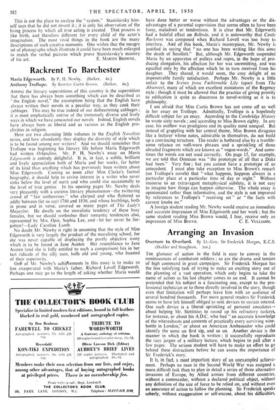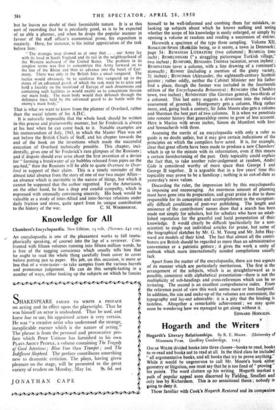Arranging an Invasion
Overture to Overlord. By Lt.-Gen. Sir Frederick Morgan, K.C.B. (Hodder and Stoughton. zos.)
THE glamour of action in the field is easy to convey in the reminiscences of combatant soldiers ; so are the drama and tension of high command in great campaigns. Sir Frederick Morgan has the less satisfying task of trying to make an exciting story out of the planning of a vast operation, which only begins to take the name of action as his last chapter comes to an end. It cannot be pretended that his subject is a fascinating one, except to the pro- fessional technician or to those directly involved in the story, though even that limitation will perhaps leave him with an audience of several hundred thousands. For more general readers Sir Frederick seems to have felt himself obliged to seek devices to sustain interest. One such device is a liberal sprinkling of personal anecdotes— about helping Mr. Stettinius to round up his refractory turkeys, for instance, or about his A.D.C. who had " an accurate knowledge of the whereabouts and contents of practically every surviving wine- bottle in London," or about an American Ambassador who could identify the same on first sip, and so on. Another device is the manner in which the book is written ; it successfully reproduces the racy jargon of a military lecture, which begins to pall after a few pages. The serious student will have to make an effort to go behind these distractions before he can assess the importance of Sir Frederick's story.
It is, in fact, a most important story of an unexampled achieve- ment. Perhaps no man in the Second World War was assigned a more difficult task than to plan in detail a series of three alternative invasions of Europe, by Allied armies from different countries, without a commander, without a declared political object, without any definition of the size of force to be relied on, and without even an assurance of action to follow the planning. Sir Frederick speaks soberly, without exaggeration or self-excuse, about his difficulties.
but he leaves no doubt of their formidable nature. It is at this sort of recording that he is peculiarly good, as is to be expected of so able a planner, and when he drops the popular manner in favour of the staff officer's economical prose, his exposition is masterly. Here, for instance, is-his initial appreciation of the task before him:
" The strategic map showed us at once that .. . our Army lay with its head in South England and its tail in the neighbourhood of the Western seaboard of the United States. The problem in its simplest terms was first to concentrate this Army forward on to the line of the Rhine and then to advance into the heart of Ger- many. There was only in the British Isles a small vanguard. The tactics would obviously be to reinforce this vanguard up to the status of an advanced guard, of which the task must be to seize and hold a locality on the mainland of Europe of such dimensions and containing such facilities as would enable us to concentrate therein our main body. The main body would then debouch through the defensive lines held by the advanced guard to do battle with the enemy's main body."
That is what we want to know from the planner of Overlord, rather than the social talents of his A.D.C.
It is naturally impossible that the whole book should be written in this precise and praiseworthy manner, but Sir Frederick is always at his best when he can come back to it. Notable examples are his memorandum of July, 1943, in which the Master Plan was set out before the British Chiefs of Staff, and his chapter towards the end of the book on the inventions which made the successful execution of Overlord technically possible. This chapter, inci- dentally, gives one of Sir Frederick's rare glimpses of the Russians ; and if dispute should ever arise about the first invention of a device for " forming a breakwater of air bubbles released from pipes on the sea-bed," then the Russians will be able to quote Overture to Over- lord in support of their claim. This is a timely reminder of the almost total absence from the story of one of our two major Allies— an absence which is inevitable in the nature of things, but which it cannot be supposed that the author regretted. For the Americans, on the other hand, he has a deep and candid sympathy, which is expressed with unusually convincing sincerity. His book would be valuable as a study of inter-Allied and inter-Service relations under daily friction and stress, quite apart from its unique contribution











































 Previous page
Previous page